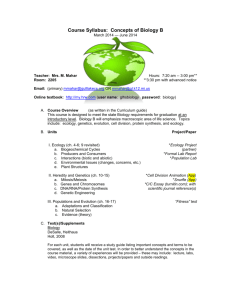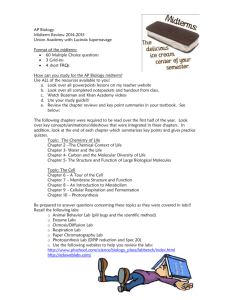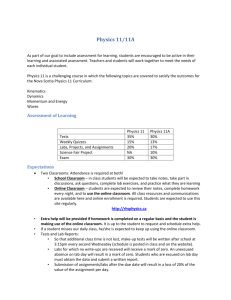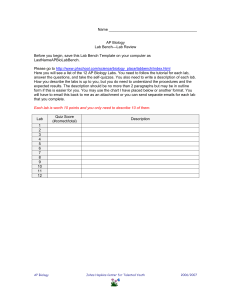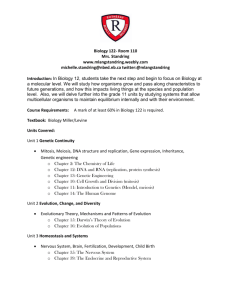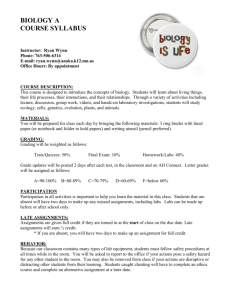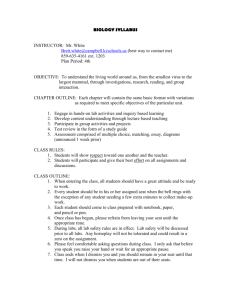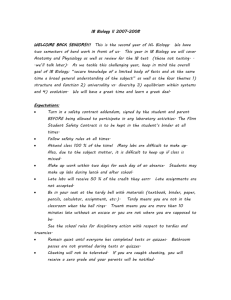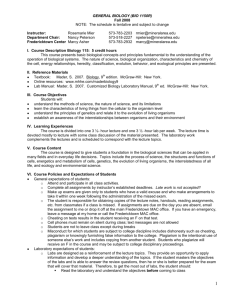ap biology - Fort Thomas Independent Schools
advertisement
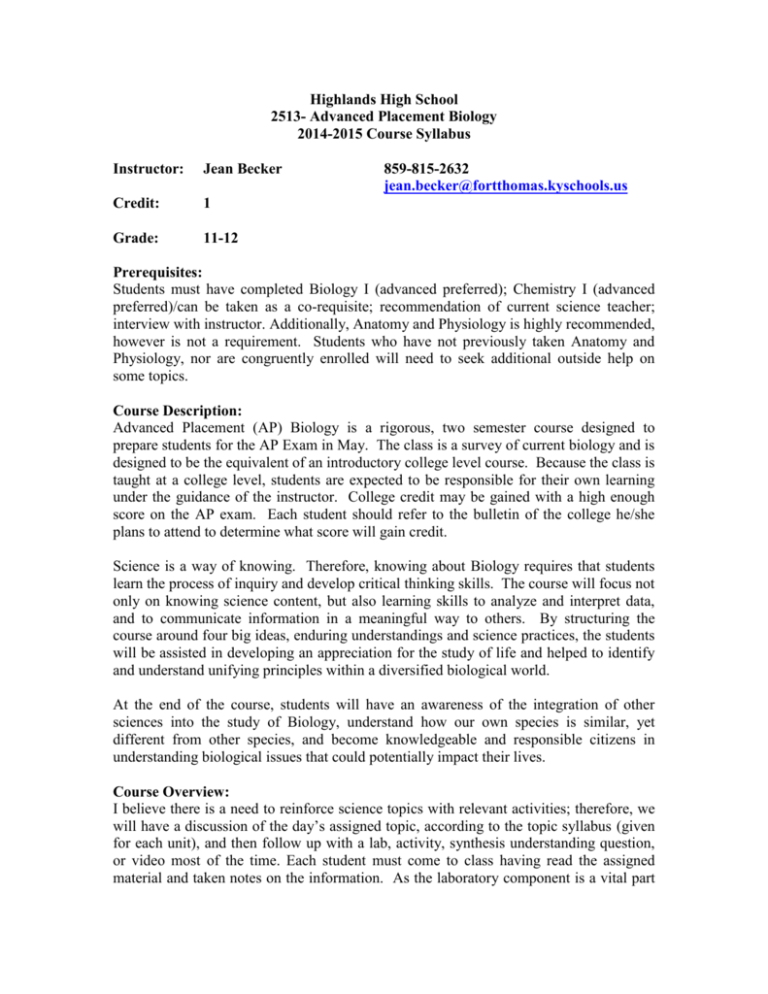
Highlands High School 2513- Advanced Placement Biology 2014-2015 Course Syllabus Instructor: Jean Becker Credit: 1 Grade: 11-12 859-815-2632 jean.becker@fortthomas.kyschools.us Prerequisites: Students must have completed Biology I (advanced preferred); Chemistry I (advanced preferred)/can be taken as a co-requisite; recommendation of current science teacher; interview with instructor. Additionally, Anatomy and Physiology is highly recommended, however is not a requirement. Students who have not previously taken Anatomy and Physiology, nor are congruently enrolled will need to seek additional outside help on some topics. Course Description: Advanced Placement (AP) Biology is a rigorous, two semester course designed to prepare students for the AP Exam in May. The class is a survey of current biology and is designed to be the equivalent of an introductory college level course. Because the class is taught at a college level, students are expected to be responsible for their own learning under the guidance of the instructor. College credit may be gained with a high enough score on the AP exam. Each student should refer to the bulletin of the college he/she plans to attend to determine what score will gain credit. Science is a way of knowing. Therefore, knowing about Biology requires that students learn the process of inquiry and develop critical thinking skills. The course will focus not only on knowing science content, but also learning skills to analyze and interpret data, and to communicate information in a meaningful way to others. By structuring the course around four big ideas, enduring understandings and science practices, the students will be assisted in developing an appreciation for the study of life and helped to identify and understand unifying principles within a diversified biological world. At the end of the course, students will have an awareness of the integration of other sciences into the study of Biology, understand how our own species is similar, yet different from other species, and become knowledgeable and responsible citizens in understanding biological issues that could potentially impact their lives. Course Overview: I believe there is a need to reinforce science topics with relevant activities; therefore, we will have a discussion of the day’s assigned topic, according to the topic syllabus (given for each unit), and then follow up with a lab, activity, synthesis understanding question, or video most of the time. Each student must come to class having read the assigned material and taken notes on the information. As the laboratory component is a vital part of a good Biology program, we will be devoting about 25 - 30% of our allotted class time to performing labs. Occasionally, it may be necessary to run or carryover labs after school. We will cover recommended investigative labs, put forth by Collegeboard, in depth and also cover content related material using our textbook, Campbell Biology. In addition to the investigative labs we will also perform a vast number of activities, and other relevant research projects. Course Standards: Students will: develop a deep level of understanding of biological concepts and vocabulary. use scientific reasoning through analysis and synthesis. work with scientific concepts that will guide them through the design of scientific investigations and discoveries. become familiar with scientific equipment, techniques, technology and mathematics to improve scientific investigations and communications and to communicate designs, procedures, and results of investigations. discuss critical interactions between science and society. develop critical thinking skills in order to access important aspects of biological issues. be able to connect other disciplines with biological topics and concepts. gain an understanding and appreciation for the history of biology and science and from that, be able to more clearly discuss the critical interactions between science and society. Course Expectations: Students will: Complete assigned summer work Attend class regularly. (See make-up policy below.) Follow directions carefully Use scientific reasoning through analysis and synthesis Study and read outside of class. This will include weekends and holidays. Complete all assignments on time. Bring all required materials to class. (See below.) Be able to present a point of view in writing Work cooperatively in groups Develop group and individual work skills Work with the school to ensure proper register for the AP Exam Take the AP exam. Ask questions and be communicative about areas of need Be prepared to work on inquiry based labs outside of the “normal” classroom time Be prepared. If you do no work outside of class, you WILL NOT pass the AP class or the AP Exam. A lab safety contract must be signed by the student and parent/legal guardian and on file with the instructor before students will be allowed to participate in labs. Text: Campbell & Reece, AP Edition Biology, Pearson Benjamin Cummings, 2008, 8th edition Other Materials: Students will need to bring a notebook, pens, pencils, and AP book. Students also need internet access (available at the resource center if not at home). Materials that will be used in class will include but are not limited to: AP Biology Test Prep Series, Holtzclaw & Holtzclaw, Pearson Benjamin Cummings, 2008, 8th edition Calculators – TI 83 (may be checked out for completion of labs/homework). Various interfaces and probes – Dissolved O2, pH, colorimeter, etc. Anatomy system models/DVD tutorials DNA models Organic compound models Technological Assistance: Students also need internet access (available at the resource center, or the public library if not available at home). Students will be expected to be able to access, complete, and submit some assignments via computer. The textbook also has a very good CD-Rom which will serve as a good tutorial. Assignments/Attendance: All assignments are due in class on the given due date. No credit will be given for late assignments without prior arrangements. If a student is absent, any work is due on the day the student returns to school. Students are encouraged to contact me via email if class is missed. All reading should be done before we discuss the topics in class. All labs are crucial to the course and are hands-on unless otherwise noted. Most labs take three or more days of class time. The first day is pre-lab (introduction to the lab, review or introduction of techniques, safety precautions, set-up, etc.); the second (+) days is for data generation/collection day(s), the third (last) day is post-lab (review of calculations, comparison of data, discussion of lab). The total amount spent on lab activities is greater than 25% of the total class time, so it is very important to be in class during labs as they are very difficult to make-up. At times, it may be necessary to utilize time after or before school to complete lab activities. You will be given notice prior to these instances. You need to be in class, on time every day in order to perform well in this course. The policy in your student handbook will be followed. You will have no longer than one week following an excused absence to complete makeup work or missed labs in order to receive credit. If you are absent on a day that a previous assignment was due, I will expect you to turn it in upon your return. It is critical to discuss missed labs immediately with me, some lab materials will not last a week. The best policy for success is to be in class! It is the students’ responsibility to follow up on missed assignments, not the teacher’s. RESPECT, RESPONSIBILITY and MATURITY will guide all of our classroom behavior. The intensity of this course and the associated labs will require a higher level of maturity and seriousness than a typical high school class. Disruptions and immature behavior are unacceptable. Homework: It is expected that at least 5 hours (an average of one hour per evening) of homework will be necessary per week. You must complete the assigned reading and/or complete the assigned questions before class. You will be “lost” in class if you have not read the assigned sections or attempted the questions assigned. Be prepared to present and explain how you approached a question to others in the class. When possible assignments will be given several days/weeks before they are due, so plan accordingly. Grading: Student grades will be based on exams, quizzes, homework assignments, laboratory activities and class-work. All exams will contain AP-style multiple-choice, grid in questions and free-response questions. In addition, we will write many free-response questions as assignments throughout the year. There will also be group and individual projects including but not limited to research on genetic diseases, cell models, and journal article reviews. Additionally, several topics will be assigned as independent study. All points carry the same weight and grades are determined by a simple percentage out of the total. Portfolio: Each student must keep a portfolio of the labs performed throughout the year. Lab write ups must be your own work even if the lab was performed and discussed as a group. This portfolio may be checked and graded at the end of each semester, or checked randomly. Do not let this fall behind. Colleges may request to see your AP lab portfolio prior to granting credit. Class Procedures: All students are expected to adhere to a high level of academic integrity (see student handbook) and self-discipline. Self discipline is especially important during laboratory procedures. Students will be working with chemicals, live materials, and expensive equipment. Each student must be familiar with and adhere to all laboratory safety guidelines. Additionally, students will be expected to adhere to the following: Follow all school wide policies. Talk in class when called upon. DO NOT TALK when someone else is speaking. You have to give respect to get it. Be on time. Eating, drinking is OK with me as long as you clean up after yourself. If people do not clean up after themselves, I will suspend the privilege of eating and drinking in class. Respect your friends and myself by doing NOTHING TO INTERFERE with your learning, another student’s learning or the teacher’s presentation. Positive attitudes appreciated, negative attitudes keep to yourself. Keep comments on a positive note. The old saying: “if you can’t say something nice, don’t say anything at all”, applies to our class. Commenting on not liking the assignment, moaning or groaning about what you think is silly will not get you far. Use restroom before class only. No leaving the classroom once class starts. Do not ask to leave for the bathroom in the middle of class unless it is an emergency. We now have an open Wi-Fi system. You may bring in other electronic devices as long as you are using them for biology work, not games, videos, pictures and chatting. If I see you using them in that manner, I will take them from you, give them to the assistant principal, and you will lose the opportunity to use them in my class. On the subject of electronic devices, cell phones and MP3’s cannot be used in class unless we are COMPLETELY finished and I give you permission to use them. If I see them, I will take them. I reserve the right to collect all cell phones before a test. You will get them back when you leave. If a phone or electronic device is out during a test or a quiz, you will receive a zero on the assignment (so don’t “check the time or your texts” – if the devise is out I will consider it cheating). Closed shoes must be worn in some of our lab exercises. Therefore, keep a pair of old gym shoes in your locker for lab days. Inappropriate shoes will require the lab to be completed after school. Make sure area is clean when leaving. We can have a great deal of fun this year if ALL OF YOU ALLOW IT. I will work hard for you; I expect the same in return! Topics to Be Covered: We will have weekly schedules which will be subject to change based on school closings, activities, materials etc. Students must keep up with the material so that we can cover all topics in a timely manner. Guest lecturers (professors from nearby universities), potential field trips to Thomas More College, Northern Kentucky University and The University of Cincinnati, will be scheduled as closely to the corresponding topics as possible. However, the professor’s schedules and field trips may require some flexibility on our part. Introduction and Biochemistry 1 – Introduction to AP Biology 2 – Chemistry of Life (self-study and recap in class) 3 – Water 4 – Carbon and Molecular Diversity 5 - Macromolecules Cells and Cell Cycle 7 – Membrane Structure and Function 6 – Tour of a Cell 12 – Cell Cycle Suggested Labs Introduction to Inquiry Labs, Graphing Macromolecules – testing and model making Essay Writing, Rubric Setting and Practice Grading Suggested Labs Cell observations with a Microscope (microscopy) 44 – Osmoregulation and Excretion (self-study) Osmosis – dialysis tubing, potatoes Mitosis Explore properties of water Cellular Energy Suggested Labs 8 – Introduction to Metabolism Enzymes – computer probe lab 9 – Cellular Respiration Respiration – pea respiration 10 – Photosynthesis Photosynthesis Organism Form and Function Suggested Labs 11 – Cell Communication Cell Communication – simulation or website 45 – Hormones and the Endocrine investigation System Hormones – project (Endocrine diseases) 48 – Neurons, Synapses and Signaling Nerve signaling – simulation or website 43 – Immune System Investigation 40 – Basic Principles of Animal Form and Function (self-study) Genetic Basis of Life Suggested Labs 13 – Meiosis and Sexual Life Cycles Meiosis simulation 14 – Mendel and the Gene Idea Fast Plant – who’s the daddy? 15 – Chromosome Basis of Fruit Fly Genetics simulation, Chi Square test Inheritance Genetic Corn 21 – Genomes and their Evolution Human Genetic Diseases – project Gene Activity and Suggested Labs DNA Isolation Biotechnology 16 – Molecular Basis of Heredity Transformation using pGLO 17 – From Gene to Protein Restriction Enzymes and Gel Electrophoresis 18 – Regulation of Gene Expression 20 – Biotechnology 19 – Viruses (self-study) Evolution and Phylogeny Suggested Labs 22 – Descent with Modification: Population Genetics Darwin Hardy-Weinberg Lab 23 – Evolution of Populations Artificial Selection – predator/prey selection 24 – Origin of Species simulation 25 – History of Life on Earth Blast Lab 26 – Phylogeny and the Tree of Life Ecology Suggested Labs 52 – Introduction to Ecology Animal Behavior – red worms or pill bugs 53 – Population Ecology Transpiration – whole plant method 54 – Community Ecology Aquatic Production – ecosystem simulation 55 – Ecosystems with probes 56 – Conservation Biology Conservation of a species - project 51 – Animal Behavior (self-study) Investigative Projects: Investigative projects will be used to create opportunities for students to extend the learning objectives from the Big Ideas outside of the laboratory investigations. (see chart below). Students may be required to develop projects in the any of the following formats: written report, poster presentation, PowerPoint presentation, informational pamphlet, or oral presentation. Projects should encourage students to connect their biological and scientific knowledge to major social issues. The topics offered are anticipated to change especially as new subject or current events emerges in the field of Biology. Students will be required to complete one investigative project per content unit for a total of eight total projects. At least two projects over the year must be related to major social issue. (See chart next page) Investigative Project Board by Content Topic, Big Idea and Possible Topics Content Topic Introduction and Biochemistry Big Idea 2 and others Cells and Cell Cycle 3 and others Cellular Energy 2 and others Organism Form and Function 3 and others Genetic Basis of Life 3 and others Gene Activity and Biotechnology 3 and others Evolution and Phylogeny 1 and others Ecology 4 and others Possible Topics – Students may suggest others - Relationship of protein folding and structure to function - How organisms exploit the properties of water to survive - Adaptations of organisms to changing water levels - Acid precipitation - Symptoms of trace element deficiency - Adaptations of organisms to Se or other toxic elements - Factors that control or regulate cell cycle - Hayflick limit – what is it and what does it mean to cell cycle? - Aging diseases such as Progeria - Multi-cellularity - evolution of complexity - Cancer – when cell division control goes wrong - Stem cell - Global climate change and photosynthesis - Why do cells use ATP? - What’s new in brewing? - Diseases of the human respiration system - Why evolution needed aerobic respiration - Human Endocrine diseases – causes and cure? - Linking cell communication, the endocrine system and the nervous system - When nerve signaling doesn’t work - Immune system disorders – causes and cure? - HIV – what is the latest? - Antibiotic Resistance and the problems with improper antibiotic use - Human Genetic disease report – cause and cure? - Use of genetic information - RNA harnessed to control cells - RNAi – what is it and what does it do? - Epigenetics – how important is it? - Alphabet of Life – origin of the genetic code - Development of Glofish - Genetically modified pets – just because we can, should we? - HOX genes – why are they important? - What’s the latest in gene therapy? - What’s the latest technology break-through in biotechnology? - Genetically modified food - Deep sea events – the origin of life location? - Evolution of dogs – evolution in an eye-blink - Evo-Devo – what is it all about? - Gene duplication and human evolution - the RNA world’s role in the origin of life - Sponges or Comb jellies as the earliest animal? - How many kingdoms should we have? - Acid precipitation – why should we worry? - Global warming – truth or fiction? - Humans: cause of latest mass extinction event? - Invasive species in our town, county and state - Supersites in our state – location and cleanup progress Academic Integrity – i.e. cheating Cheating is a very serious issue to me and therefore our class!!!! If a student is caught cheating (copying homework, allowing someone to copy your work, using a “cheat sheet”, plagiarism, aiding another student with a test/quiz/homework, using notes/electronic devises during a test/quiz, altering grades, etc…) it will result in an immediate zero. Additionally, the schools rules for cheating and plagiarism will be followed. This is a very serious issue both in my classroom, Highlands, College, and the “real world”. Please read the Academic integrity section of your student handbook clearly. I also will discuss the incident with your parent/guardians. When you put your name on a paper, it is your work – not a friends, parents, siblings etc… so take pride in your effort. I will help you if you are having difficulty, I cannot help you if you receive a zero for cheating.
